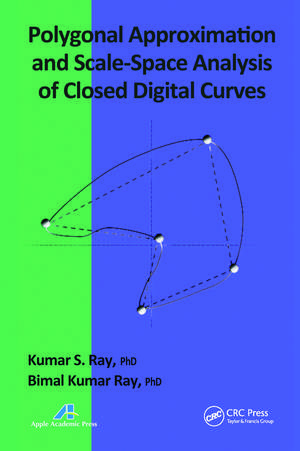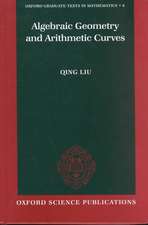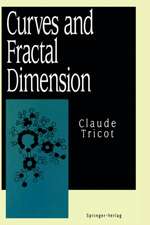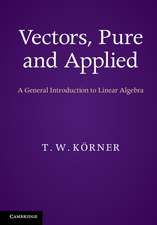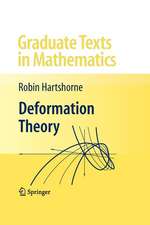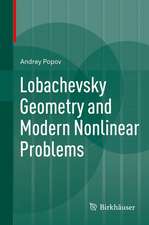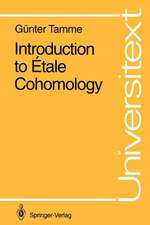Polygonal Approximation and Scale-Space Analysis of Closed Digital Curves
Autor Kumar S. Ray, Bimal Kumar Rayen Limba Engleză Paperback – 31 mar 2021
| Toate formatele și edițiile | Preț | Express |
|---|---|---|
| Paperback (1) | 587.01 lei 6-8 săpt. | |
| Apple Academic Press Inc. – 31 mar 2021 | 587.01 lei 6-8 săpt. | |
| Hardback (1) | 1282.05 lei 6-8 săpt. | |
| Apple Academic Press Inc. – 19 feb 2013 | 1282.05 lei 6-8 săpt. |
Preț: 587.01 lei
Preț vechi: 733.76 lei
-20% Nou
Puncte Express: 881
Preț estimativ în valută:
112.34€ • 116.39$ • 93.75£
112.34€ • 116.39$ • 93.75£
Carte tipărită la comandă
Livrare economică 21 martie-04 aprilie
Preluare comenzi: 021 569.72.76
Specificații
ISBN-13: 9781774632642
ISBN-10: 1774632640
Pagini: 388
Ilustrații: 153
Dimensiuni: 156 x 234 x 20 mm
Greutate: 0.53 kg
Ediția:1
Editura: Apple Academic Press Inc.
Colecția Apple Academic Press
ISBN-10: 1774632640
Pagini: 388
Ilustrații: 153
Dimensiuni: 156 x 234 x 20 mm
Greutate: 0.53 kg
Ediția:1
Editura: Apple Academic Press Inc.
Colecția Apple Academic Press
Public țintă
Academic and PostgraduateCuprins
Polygonal Approximation: Introduction. A Split-and-Merge Technique. A Sequential One-Pass Method. Another Sequential One-Pass Method. A Data-Driven Method. Another Data-Driven Method. A Two-Pass Sequential Method. Polygonal Approximation Using Reverse Engineering on Bresenham's Line Drawing Technique. Polygonal Approximation as Angle Detection. Polygonal Approximation as Angle Detection Using Asymmetric Region of Support. Scale-space analysis: Introduction. Scale-Space Analysis and Corner Detection on Chain Coded Curves. Scale-Space Analysis and Corner Detection Using Iterative Gaussian Smoothing With Constant Window Size. Corner detection using Bessel function as smoothing kernel. Adaptive smoothing using convolution with Gaussian Kernel. Application of Polygonal Approximation for Pattern Classification and Object Recognition: Introduction. Polygonal Dissimilarity and Scale Preserving Smoothing
Matching Polygon Fragments. Polygonal Approximation to Recognize and Locate Partially Occluded Objects: Hypothesis Generation and Verification Paradigm. Object Recognition With Belief Revision: Hypothesis Generation and Belief Revision Paradigm. Neuro-Fuzzy Reasoning for Occluded Object Recognition: A Learning Paradigm Through Neuro-Fuzzy Concept. Conclusion.
Matching Polygon Fragments. Polygonal Approximation to Recognize and Locate Partially Occluded Objects: Hypothesis Generation and Verification Paradigm. Object Recognition With Belief Revision: Hypothesis Generation and Belief Revision Paradigm. Neuro-Fuzzy Reasoning for Occluded Object Recognition: A Learning Paradigm Through Neuro-Fuzzy Concept. Conclusion.
Notă biografică
Kumar S. Ray, PhD, is a professor in the Electronics and Communication Science Unit at the Indian Statistical Institute, Kolkata, India. He has written a number of articles published in international journals and has presented at several professional meetings. His current research interests include artificial intelligence, computer vision, commonsense reasoning, soft computing, non-monotonic deductive database systems, and DNA computing.
Bimal Kumar Ray is a professor at the School of Information Technology and Engineering, Vellore Institute of Technology, Vellore, India. He received his PhD degree in computer science from the Indian Statistical Institute, Kolkata, India. He received hs master’s degree in applied mathematics from Calcutta University and his bachelor’s degree in mathematics from St. Xavier’s College, Kolkata. His research interests include computer graphics, computer vision, and image processing. He has published a number of research papers in peer-reviewed journals.
Bimal Kumar Ray is a professor at the School of Information Technology and Engineering, Vellore Institute of Technology, Vellore, India. He received his PhD degree in computer science from the Indian Statistical Institute, Kolkata, India. He received hs master’s degree in applied mathematics from Calcutta University and his bachelor’s degree in mathematics from St. Xavier’s College, Kolkata. His research interests include computer graphics, computer vision, and image processing. He has published a number of research papers in peer-reviewed journals.
Descriere
This book covers the most important topics in the area of pattern recognition, object recognition, computer vision, robot vision, medical computing, computational geometry, and bioinformatics systems. Students and researchers will find a comprehensive treatment of polygonal approximation and its real life applications. The book not only explains
